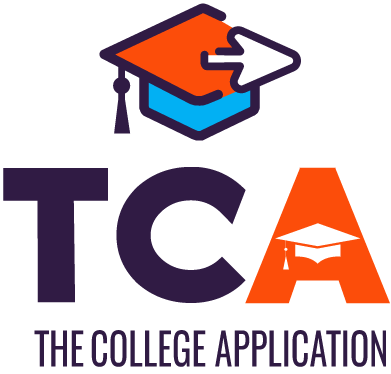Definition and importance of PCAT
We have conducted extensive research and compiled an in-depth look into the best PCAT prep books & study guides available, as well as reasons why they play a crucial role in determining the success of your future career in pharmacy.
The Pharmacy College Admission Test (PCAT) is a prerequisite for prospective students that seek admission into most, but not all, pharmacy colleges. That means that most colleges will require you to undertake PCAT for them to consider admitting you into their facilities.
This test is computer-based and standardized to assess several of your abilities, especially in critical reading, writing, chemistry, biology, and quantitative reasoning.
PCAT is renowned for being a tough test. For this reason, you need all the help you can get to ace this test. There are various diverse options out there tailored to help you to this extent, including study guide books and preparation software. We have included the most effective options in this article.
Our list of PCAT prep books and study guides outlines outstanding materials that are guaranteed to help you prepare for the PCAT exam with relative ease. All the other information below got included to help you understand the importance of this test, inform you on the length of preparation you need, and extrapolate the exam’s general scope.
If you use our article as a guide, your search for ideal PCAT preparation materials should be, arguably, easier and more fruitful.
What’s on the PCAT test?
The PCAT exam gets issued in the Pearson VUE exam centers in the US. This test requires you to take a total of 3 hours and 40 minutes to complete. It comes with one writing prompt and 192 questions with multiple choices. You also get one break during the PCAT examination.
PCAT tests five subject areas through various subtests:
• Writing
The knowledge areas tested in this category include critical thinking, written communication, and logic and argumentation.
You will be required to answer 1 writing prompt over 30 minutes in this subject area. Expect to spend roughly six minutes on every paragraph.
The writing prompt requires you to propose a solution for a stated problem that will need your addressing. You will have to answer in the form of an essay that must be original.
• Biological Processes
This subtest category will test your knowledge in general biology, human anatomy, microbiology, and physiology. The questions present in this category generally require you to state the correct term for a specific biological factor or process.
You should ensure that you are familiar with definitions and key terms if you want to succeed in Biological Processes.
It contains a total of 48 questions that you will be required to answer in 45 minutes. The questions incorporated fall within general biology (50%), human anatomy and physiology (30%), and microbiology (20%).
You can expect to spend approximately 55 seconds on each question.
You can find the topics covered in the categories incorporated above in an official list on the PCAT website.
• Chemical Processes
The Chemical Processes subtest category has a design that tests your knowledge in general chemistry, organic chemistry, and basic biochemistry processes.
It contains 48 questions that you’ll be required to address over 45 minutes. That means you are likely to spend approximately 57 seconds on each question, or 8 minutes for each passage.
The questions in this subtest category have a format similar to that of the Biological Processes section. The questions have multiple choices, usually companied by a visual, short passage, or data set.
However, unlike Biological Processes, Chemical Processes will require you to understand and be familiar with various key theories such as the kinetic theory.
The questions in this section get broken down into General Chemistry (50%), Organic Chemistry (20%), and Basic Biochemistry (30%).
• Critical Reading
Critical Reading is a subtest section that comes with 48 questions that you will be required to answer in 50 minutes. That means you will have approximately 57 seconds to tackle each question.
This section will test your skill in comprehension, analysis, and evaluation knowledge areas. The test distribution of each of these areas is as follows: comprehension (30%), analysis (40%), and evaluation (40%).
The topics in Critical Reading usually contain short and dense passages that make reading difficult. These passages address issues like the relation between political, social, and historical influences and social science, science, and humanities.
This section gets placed between sections with scientific and mathematical dispositions. Therefore you need to prepare to shift your thought process fast.
• Quantitative Reasoning
Quantitative Reasoning is the final subtest section in PCAT. It includes 48 questions that you will need to address within 50 minutes. That means you will spend approximately 57 seconds answering each question.
This section includes content that covers: basic math, algebra, probability& statistics, pre-calculus, and calculus. The distribution per content area is: basic math 50%, Algebra 25%, Probability & Statistics 18%, Precalculus 18%, and Calculus 14%.
The format of this section is similar to that of the scientific pretest sections. However, you will be required to apply some mathematical principles or equations and perform some computation to tackle each of the questions in Quantitative Reasoning.
The most important factor to consider in this section is time management. Although you will be allowed 50 minutes, some of the questions will require longer to answer than others.
What is a good score on the PCAT?
You require good scores to get admission into pharmacy school. As soon as you’ve completed your exams, the generation of initial scores for each section’s multiple choices will begin. Then, you will get your scores, which will include a percentile ranking and a scaled score.
You can expect to get the final score five weeks from the date you took the test because the writing section requires manual scoring.
A combination of the scores of all sections will give you a composite score. This score ranges on a scale of 200-600, with 400 being the average PCAT score.
If you want to join a good pharmacy school, you should first know that most of them require an average or above-average score. However, your pharmacy school of choice ought to inform you whether your performance falls within their requirements.
The scores from PCAT get retained for six years since the exam completion date.
How many times can you take the PCAT?
If you fail PCAT, you are allowed to retake up to five times. If you exhaust all five attempts and still fail, you are required to seek permission in writing before a retake. When submitting your written request, ensure you have included such documentation as PCAT ID and your name.
However, the best strategy is passing with minimum or no retakes. That is why you need all the help you can get from the best PCAT study guides.
How should you study/prep for PCAT, and for how long?
Focused preparation is key to passing PCAT. Most prospective pharmacy students end up spending tons of time spinning wheels in the name of preparing for PCAT exams, only to fail. If you want to pass this difficult test, you need to go with a study method that is effective and efficient.
Your PCAT preparation should start with the early development of in-depth learning strategies. These strategies will help you master the knowledge areas that are likely to be tested on the PCAT exam. You will need to cover material starting from freshman year if you want a strong PCAT performance.
Register after beginning your PCAT prep
You should complete your PCAT registration after your prep studies have started. You should do this if you want to stay on track and retain confidence for the PCAT exam undertaking.
When it comes to the length of time you should dedicate to PCAT prep, the crucial determiners are your academic background and personal approach to learning. However, most professionals recommend that you dedicate nine hours per week to PCAT studies for 2-6 months.
You should also settle for roughly two study tools from the large variety of PCAT prep tools available- Including online courses, tutors, study groups, and study guide books. A small combination of any of these tools will ensure you’ve covered as much as possible without overwhelming yourself.
PCAT, as we mentioned before, is a difficult exam. If you want to pass PCAT, prioritize your reading, critical thinking, and reading skills development.
Use PCAT online-guide
You can also make use of Pearson’s online guide to the PCAT. Pearson’s guide gets published for any student that wants to be familiar with the extensive coverage of each PCAT section’s knowledge area. Understanding this online guide can be crucial in strategizing your PCAT studies.
Begin with a diagnostic test and practice problems
A good, customized study plan can help you cover topics that you are unfamiliar with. You can identify these topics by starting with a diagnostic test before conducting a content review. That will help you to recognize areas you need to improve on.
You should also incorporate practice problems as you continue reviewing content. You can begin with independent questions, then slowly built into tackling a series of questions and passages, and finally complete mock tests within time requirements similar to those of the actual PCAT.
You can use either a 2-month PCAT Study Schedule or a 4-month PCAT study schedule, as outlined by Fisher Pharm.D. Online.
Ideal Time to Take the PCAT
Individual pharmacy programs tend to have different, diverse requirements. However, as a pharmacy student in a graduate program, you will more often than not be required to sit PCAT examination before or in the course of the application season.
That means that most students take the PCAT during their undergraduate degree program’s senior year. Some all-inclusive programs also allow students to get their Doctor of Pharmacy and bachelor’s degree within a minimal time frame. These programs are not typical. They require students to take PCAT in high school and to include their scores when submitting their applications.
We highly recommend you complete your PCAT way before you’re due to start your school applications. If you wait until the last minute before taking the PCAT, you may lack enough time for a retake before submitting your pharmacy school application. Remember, if you happen to fail PCAT more than five times, you’ll need to submit documentation and a written request before you can have a retake. That is just one more reason why taking PCAT earlier may save you from disappointment.
PCAT Registration Process
You should register for the PCAT examination once you’ve decided that you want to join pharmacy school and after you’ve started prepping for it.
PCAT registration and examination require you to plan well if you want to meet your choice pharmacy school’s application and PCAT score submission deadline. Your planning should also incorporate the score you are targeting and the amount of time you are willing to sacrifice in preparing for the exam.
You can check out the PCAT registration schedule from the Pearson graduate admission official website.
The registration process is simple. You can ensure you don’t miss the limited spaces available by booking early. Use this link to secure a booking. Then proceed to account creation and fill in your personal info. Select three pharmacy schools you’d like to send your PCAT scores to, then choose your preferred testing date as availed on the registration page. Finally, select the testing city that is most convenient to you.
The PCAT exam has a registration fee of $210.
Best PCAT Prep Books & Study Guides
1. Kaplan PCAT Prep Plus
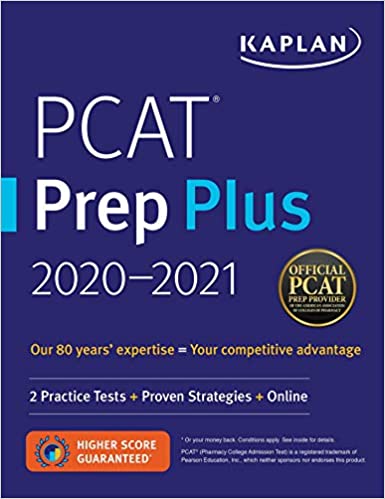
Kaplan PCAT Prep Plus is one of the best PCAT prep books. The Kaplan company promises to give you a competitive advantage from their 75+ years’ worth of expertise.
This prep book is the best example of what a PCAT study guide should entail. It covers all exam topics with impressive clarity and offers you extensive detailing to ensure your PCAT preparation is worthwhile. That is why it ranks so high on our review list.
It also includes the following:
• Practice questions and comprehensive answers that cover each subject area
• Two online practice tests that are full length
• Strategies that have been tested and proven for each PCAT section
• An extensive summary that helps you know what to expect from the PCAT exam
What makes this study book our top pick is it has thoroughly written content and relevant in-book questions. It is a good choice for your intense review or last-minute refresher needs.
If you need extra prep material to help you get a strong PCAT score, this prep book is worth your consideration.
This PCAT prep guide has a fantastic rating on Amazon.
Pros
• Well written content
• Extensive detailing
• Numerous relevant questions
Cons
• It contains a few typographical errors
2. PCAT Prep Book by Test Prep Groups
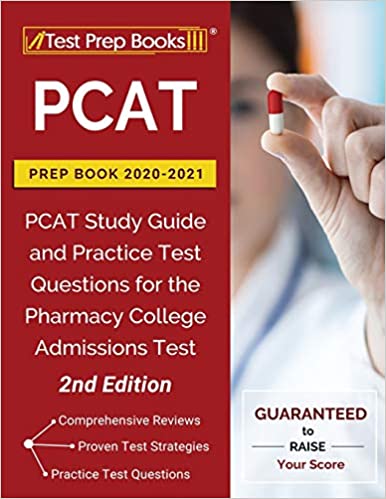
This PCAT prep book has earned this spot by providing a comprehensive review of PCAT exam content that can rival that of Kaplan’s above. However, unlike Kaplan’s, this PCAT study guide is somewhat short in providing questions and practice tests.
This prep book is resourceful for you if you need a guide with detailed explanations and the latest strategies for taking the PCAT exam. The test-taking strategy available in this prep book will help you prepare for the PCAT exam.
They will also familiarize you with the test strategies necessary to ensure you properly utilize the allocated time. Test Prep Books are responsible for the development of this prep book.
PCAT Study Guide includes the following features:
• Quick overview of what PCAT examination entails
• Extensive coverage of all the five subtest sections
• Relevant practice questions
• Detailed provision of explanations and answers
• Up to date test-taking strategies for all PCAT exam sections
Pros
• Covers all exams topics extensively
• It has detailed answers
• It offers relevant strategies for test-taking
Cons
• Contains numerous typographical and proofing errors
• Some questions are easier than the actual exam
3. PCAT Secrets Study Guide by Mometrix
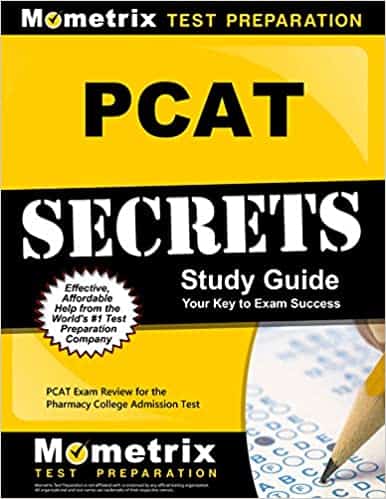
Our third best overall PCAT study guide is PCAT Secret’s Study Guide, sold by Mometrix Test Preparation. One of the things that make this prep book outstanding is its thoroughness and comprehensive approach to concept review.
All five sections of PCAT get covered with well-detailed and specific information designed to help you pass the test in this study book. Nothing gets listed without a follow-up in-depth explanation in the PCAT Secrets Study Guide prep book.
The layout of this PCAT prep book has a logical organization. This organization is logical to ensure you can navigate your way through the sections without difficulty or confusion.
The natural flow of this guide’s layout makes this guide fun to read and easy to understand resource.
Plus, unlike other prep books in the market, this has questions that match the level of difficulty present in the actual PCAT exam.
The test questions in this prep book are ideal in giving you a rough picture of what the actual exam questions will be like.
PCAT Secrets Study Guide also includes the following features:
• Extensive PCAT review
• An in-depth and thorough look into all the five PCAT sections
• Well explained and detailed explanations for each section
• Mometrix Academy video codes embedded.
• Tough exam prep for PCAT included
• Well organized study manual
• 50+ Practice test questions and explanations
This prep guide has stellar ratings on Amazon.
Pros
• thorough and well-detailed concept review
• Concepts flow easily
• Tough questions
Cons
• Practice questions are limited
4. Barron’s PCAT Pharmacy College Admission Test
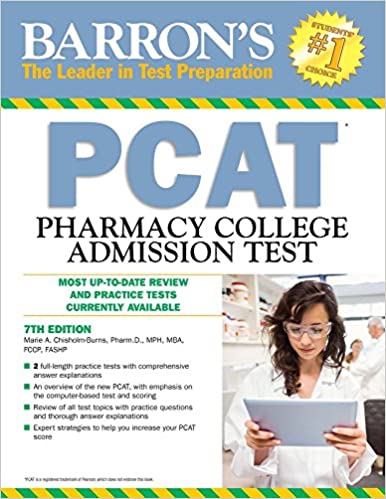
Barron’s PCAT is one of the most up-to-date PCAT prep books in the market today, and it comes fifth on our list of the best PCAT study guide.
This guide book is an updated study manual by Barrons Educational Series publisher. It should help you prepare for your success in PCAT exams.
The practice tests and detailed information in this PCAT study guide make it a prerequisite material that you can use to understand the content in the PCAT pretest sections.
Barron’s PCAT guide also comes with:
• Comprehensive explanations
• Two full-length practice tests
• Extra practice questions
• Advice on high PCAT scoring
• Thorough coverage of all PCAT sections
This PCAT study book has relatively impressive global ratings on Amazon.
Pros
• Up to date information
• Thoroughly detailed content
• Affordable
• Lots of practice questions
• Good structure and flow
Cons
• Some section questions are too easy as compared to the actual exam
5. Peterson’s Master the PCAT
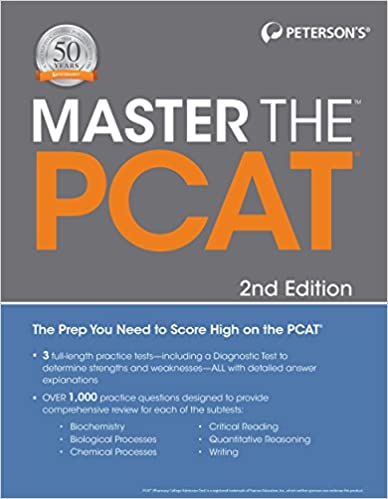
Our 5th overall best study guide is Peterson’s Master the PCAT prep book. This book ranks with the best in its thoroughness of content review. It will provide you with an explanation and information you may need to pass the PCAT.
This study guide comes with practice tests followed by well-detailed answers. It also includes a diagnostic pretest designed to let you discover your weak areas and work on them.
You will also find information relating to PCAT registration, exam scoring, and score reporting incorporated in Peterson’s Master the PCAT prep guide.
This book also includes:
• Thorough coverage of all five PCAT subtest sections
• Diagnostic test
• Study and test-taking tips
• Relevant practice tests
• Testing and scoring criteria of PCAT
Pros
• Tons of practice tests and explanations
• A thorough review of content
• A diagnostic test included for helping students identify weak areas
Cons
• Poor editing
• Not very up to date
PCAT Flashcards you can use
We mentioned before that PCAT success requires a combination of prep materials. Apart from the prep guides that we have listed above, you can also use PCAT flashcards to help you in your test preparation.
Some of the best PCAT flashcards include:
1. PCAT Flashcard Study System by Mometrix Test Preparation
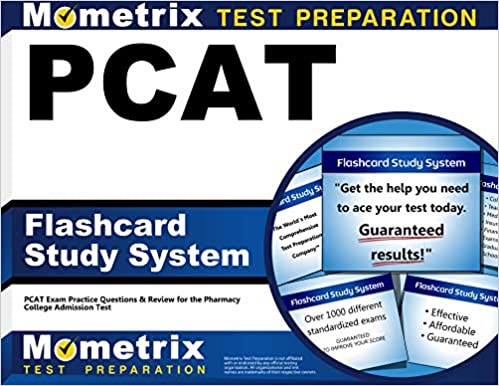
This PCAT flashcard is our most recommended prep resource. It prepares you for the test by offering 650 cards that cover all PCAT sections will in-depth information.
PCAT Flashcard system sets your career on its path to success by maximizing the benefits of repetition in test preparation. This prep guide got designed to help you understand the process of breaking down and tackling complicated test questions.
Pros
• Extensive coverage of analogies in this flashcard’s verbal section
• Very easy to understand because the exams for each section got broken down for digestibility
• All subtest sections get covered in detail
• It is portable
• The answers are well-explained
Cons
• Content review and explanations may be too detailed for anyone that wants simple study flashcards.
2. PCAT Pharmacy College Admission Test: Flashcard Book + Online
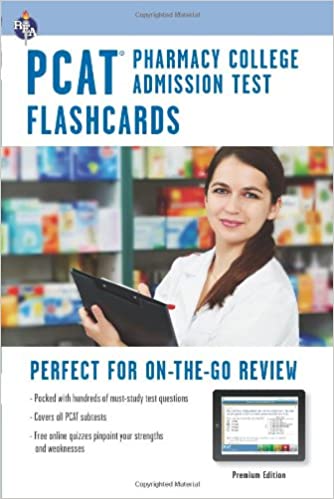
This resource isn’t actually in the form of physical flashcards; it is a book that contains questions that have the same short form as those on PCAT flashcards.
The test questions on PCAT Pharmacy College Admission Test are quite relevant, though they may not go well with every prospective pharmacy student.
This material comes with 350+ practice questions and thorough coverage of all five PCAT pretest sections. If you want to ensure you get the best PCAT score, this book offers you diagnostic questions that are specialized and highly targeted.
Pros
• Diagnostic practice questions help you test your level of preparation
• It contains a large number of prep questions
• It covers all five sections
• Includes extra online resources
• You can create flashcards that are accessible from any electronic device from their tools
Cons
• A few errors scattered throughout the book
• Not the best for exam timing practice
Conclusion
PCAT requires adequate preparation. If you fail to prepare, you may not pass. The list of PCAT prep books, study guides, and flashcards that we have included above will help you familiarize yourself with this test and formulate a strategy that will help you get a high score.
A good combination of any of the best materials that we have reviewed above will provide the best PCAT study guide any student can ask for.
Related Readings:
How to write a Compelling Pharmacy Personal Statement (w/Prompts & Examples)
